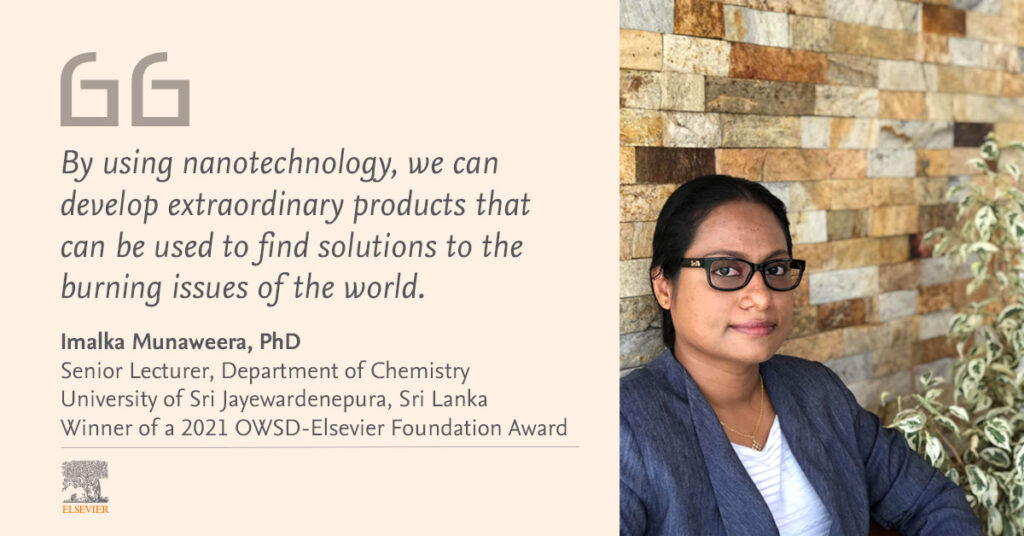Harnessing nanotechnology for cancer drug delivery and ecofriendly fertilizers
Categories: NEWS, INCLUSIVE RESEARCH, Awards
Tags: SDG5, AWARDS & PRIZES
Deep family loyalty led this Sri Lankan researcher to invent innovative treatments for cancer

Responsibility landed early on the shoulders of Dr Imalka Munaweera. Her family struggled financially due to the illness of her father, a businessman who suffered from bone marrow cancer. As the eldest of four children, the young Imalka would care for her three younger brothers while her father was ill and encourage them with their schoolwork. Rather than view it as a burden, however, she took on the challenge with a clear eye to building a sustainable future for the whole family:
I thought, the only way to overcome these difficulties was to succeed in education and perform well in school to get a good job opportunity in the future.
Describing herself as a highly focused child, she needed only to decide where to direct her efforts, and that decision was easy. Her father suggested business studies, but Imalka was adamant about what she wanted to study:
I was seriously interested in science subjects when I was a schoolgirl and always, I was within the top performers in the classroom. I really wanted to be a professor in science one day. I also liked to read, especially science stories. When I was about 10 years old, I read the story of Edison inventing the electric bulb. I thought to myself, ‘One day, I will discover something related to science.’
Today, she is a Senior Lecturer in the Department of Chemistry at the University of Sri Jayewardenepura in Sri Lanka. With her three brothers now grown and working as engineers and four US-granted patents under her belt — including two for cancer treatment that she is particularly proud of — Imalka has already achieved more than she had dreamt as a child.
But she is clearly just getting started.
Next on her wishlist is to become a full professor. Now, as one of the five winners of this year’s OWSD-Elsevier Foundation Award for Early Career Women Scientists in the Developing World, she sees the opportunities before her expanding even more:
Winning this award is one of the biggest achievements in my life. Professionally, the prize makes me feel like I am an important person to the world as far as my research achievements are concerned, and I am so excited and motivated. … Also, the professional audience will warmly welcome me to conduct collaborative research as an OWSD-Elsevier Foundation prize winner.
She accepted the award on Tuesday in a virtual ceremony at the AAAS Annual Meeting.
The prize money is a big help, too. Sri Lanka’s economy, already fragile, has been hit hard by the impact of the COVID-19 pandemic. “Personally, this prize provides huge financial support to me,” she said. “Prices of goods and commodities are going up, and we are all in a difficult situation.”
Read the full article on Elsevier Connect: “Harnessing nanotechnology for cancer drug delivery and ecofriendly fertilizers“, Liana Cafolla, 11 February 2021.

















